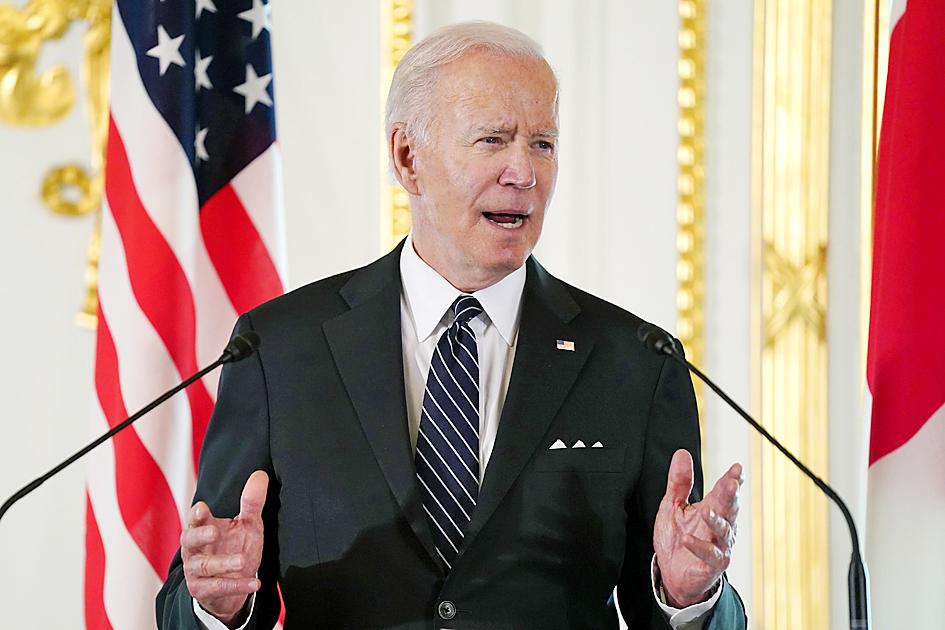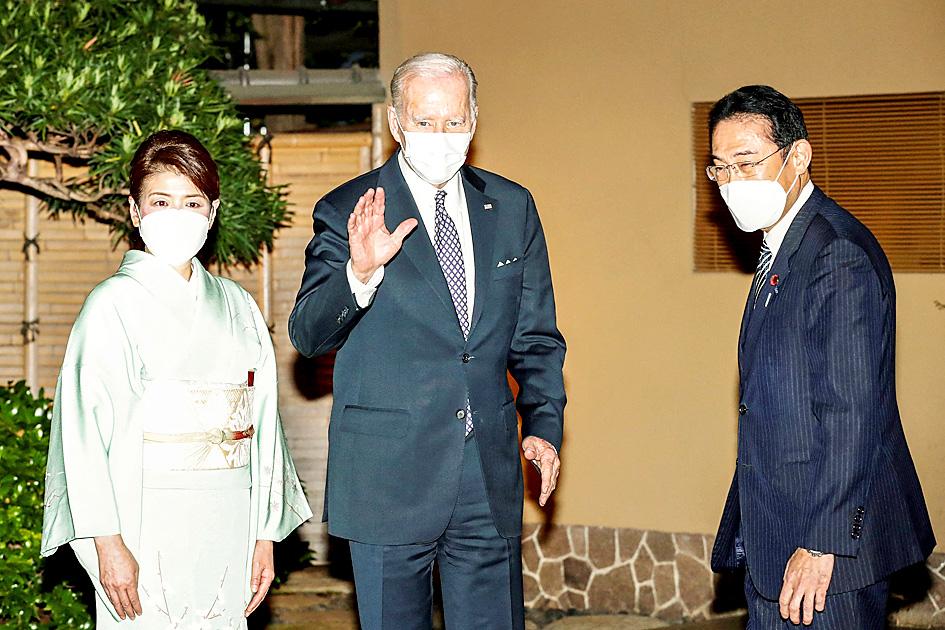US President Joe Biden yesterday vowed that US forces would defend Taiwan militarily in the event of a Chinese attack in his strongest statement to date on the issue.
Beijing is already “flirting with danger,” Biden said following talks with Japanese Prime Minister Fumio Kishida in Tokyo, in which the pair agreed to monitor Chinese naval activity and joint Chinese-Russian exercises.
Asked if Washington was willing to get involved militarily to defend Taiwan, he replied: “Yes.”

Photo: AP
“That’s the commitment we made,” Biden said. “We agreed with the ‘one China’ policy, we signed on to it ... but the idea that it can be taken by force is just not appropriate, it would dislocate the entire region and would be another action similar to Ukraine.”
Biden directly linked the fates of Ukraine and Taiwan, saying that sanctions on Russia must exact a “long-term price,” because otherwise “what signal does that send to China about the cost of attempting to take Taiwan by force?”
He warned that Beijing was “flirting with danger right now by flying so close and all the maneuvers undertaken,” referring to a growing number of Chinese sorties, naval exercises and other power projections in the Taiwan Strait.

Photo: Reuters
In Washington, the White House said that Biden was not diverging from the US’ official “one China” policy, which includes the commitment to “provide Taiwan with the military means to defend itself.”
“Our policy has not changed,” an official said.
In Taipei, Ministry of Foreign Affairs spokeswoman Joanne Ou (歐江安) thanked Biden and the White House for their “rock solid” commitment to Taiwan.
The threat China poses to security in the Taiwan Strait is of great concern to the international community, Ou told reporters, adding that Taiwan’s determination to defend its freedom and democracy has never changed.
In Beijing, Chinese Ministry of Foreign Affairs spokesman Wang Wenbin (汪文斌) said that “no one should underestimate the firm resolve, staunch will and strong ability of the Chinese people in defending national sovereignty and territorial integrity.”
“China has no room for compromise or concession,” Wang said.
Japanese public broadcaster NHK predicted that Biden’s comments would spark debate, as they appear to contradict the long-running US policy of “strategic ambiguity” toward Taiwan.
Biden made similar comments in October last year when asked during a CNN town hall whether the US would come to Taiwan’s defense, responding: “Yes, we have a commitment to do that.”
In August last year, he listed Taiwan among nations the US has a commitment to defend in comments to ABC News.
In both instances, the White House made statements shortly afterward saying that US policy toward Taiwan had not changed.
Meanwhile, Kishida called for stability in the Taiwan Strait and said that Tokyo was committed to boosting its defense spending, a sensitive subject in a nation with constitutional limits on its military.
“Japan will fundamentally strengthen its defense capacity, and to back that up will significantly increase its defense spending,” Kishida told a news conference held with Biden. “We do not rule out any options, including [acquiring] the capacity to counterattack.”

CHAOS: Iranians took to the streets playing celebratory music after reports of Khamenei’s death on Saturday, while mourners also gathered in Tehran yesterday Iranian Supreme Leader Ayatollah Ali Khamenei was killed in a major attack on Iran launched by Israel and the US, throwing the future of the Islamic republic into doubt and raising the risk of regional instability. Iranian state television and the state-run IRNA news agency announced the 86-year-old’s death early yesterday. US President Donald Trump said it gave Iranians their “greatest chance” to “take back” their country. The announcements came after a joint US and Israeli aerial bombardment that targeted Iranian military and governmental sites. Trump said the “heavy and pinpoint bombing” would continue through the week or as long

TRUST: The KMT said it respected the US’ timing and considerations, and hoped it would continue to honor its commitments to helping Taiwan bolster its defenses and deterrence US President Donald Trump is delaying a multibillion-dollar arms sale to Taiwan to ensure his visit to Beijing is successful, a New York Times report said. The weapons sales package has stalled in the US Department of State, the report said, citing US officials it did not identify. The White House has told agencies not to push forward ahead of Trump’s meeting with Chinese President Xi Jinping (習近平), it said. The two last month held a phone call to discuss trade and geopolitical flashpoints ahead of the summit. Xi raised the Taiwan issue and urged the US to handle arms sales to

BIG SPENDERS: Foreign investors bought the most Taiwan equities since 2005, signaling confidence that an AI boom would continue to benefit chipmakers Taiwan Semiconductor Manufacturing Co’s (TSMC, 台積電) market capitalization swelled to US$2 trillion for the first time following a 4.25 percent rally in its American depositary receipts (ADR) overnight, putting the world’s biggest contract chipmaker sixth on the list of the world’s biggest companies by market capitalization, just behind Amazon.com Inc. The site CompaniesMarketcap.com ranked TSMC ahead of Saudi Aramco and Meta Platforms Inc. The Taiwanese company’s ADRs on Tuesday surged to US$385.75 on the New York Stock Exchange, as strong demand for artificial intelligence (AI) applications led to chip supply constraints and boost revenue growth to record-breaking levels. Each TSMC ADR represents

Pro-democracy media tycoon Jimmy Lai’s (黎智英) fraud conviction and prison sentence were yesterday overturned by a Hong Kong court, in a surprise legal decision that comes soon after Lai was jailed for 20 years on a separate national security charge. Judges Jeremy Poon (潘兆初), Anthea Pang (彭寶琴) and Derek Pang (彭偉昌) said in the judgement that they allowed the appeal from Lai, and another defendant in the case, to proceed, as a lower court judge had “erred.” “The Court of Appeal gave them leave to appeal against their conviction, allowed their appeals, quashed the convictions and set aside the sentences,” the judges